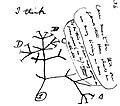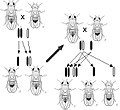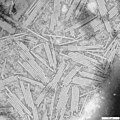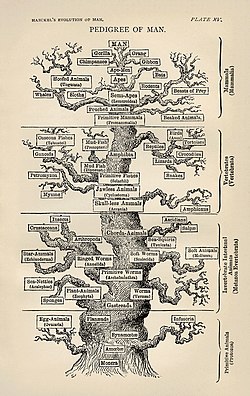Portal:Biology
Introduction


Biology is the scientific study of life and living organisms. It is a broad natural science that encompasses a wide range of fields and unifying principles that explain the structure, function, growth, origin, evolution, and distribution of life. Central to biology are five fundamental themes: the cell as the basic unit of life, genes and heredity as the basis of inheritance, evolution as the driver of biological diversity, energy transformation for sustaining life processes, and the maintenance of internal stability (homeostasis).
Biology examines life across multiple levels of organization, from molecules and cells to organisms, populations, and ecosystems. Subdisciplines include molecular biology, physiology, ecology, evolutionary biology, developmental biology, and systematics, among others. Each of these fields applies a range of methods to investigate biological phenomena, including observation, experimentation, and mathematical modeling. Modern biology is grounded in the theory of evolution by natural selection, first articulated by Charles Darwin, and in the molecular understanding of genes encoded in DNA. The discovery of the structure of DNA and advances in molecular genetics have transformed many areas of biology, leading to applications in medicine, agriculture, biotechnology, and environmental science.
Life on Earth is believed to have originated over 3.7 billion years ago. Today, it includes a vast diversity of organisms—from single-celled archaea and bacteria to complex multicellular plants, fungi, and animals. Biologists classify organisms based on shared characteristics and evolutionary relationships, using taxonomic and phylogenetic frameworks. These organisms interact with each other and with their environments in ecosystems, where they play roles in energy flow and nutrient cycling. As a constantly evolving field, biology incorporates new discoveries and technologies that enhance the understanding of life and its processes, while contributing to solutions for challenges such as disease, climate change, and biodiversity loss. (Full article...)
Selected article -
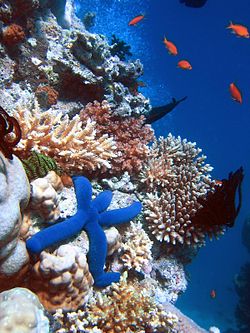
An ecosystem (or ecological system) is a system formed by organisms in interaction with their environment. The biotic and abiotic components are linked together through nutrient cycles and energy flows.
Ecosystems are controlled by external and internal factors. External factors—including climate—control the ecosystem's structure, but are not influenced by it. By contrast, internal factors control and are controlled by ecosystem processes; these include decomposition, the types of species present, root competition, shading, disturbance, and succession. While external factors generally determine which resource inputs an ecosystem has, their availability within the ecosystem is controlled by internal factors. Ecosystems are dynamic, subject to periodic disturbances and always in the process of recovering from past disturbances. The tendency of an ecosystem to remain close to its equilibrium state, is termed its resistance. Its capacity to absorb disturbance and reorganize, while undergoing change so as to retain essentially the same function, structure, identity, is termed its ecological resilience. (Full article...)
Selected picture -

Major topics
Selected biography -
Daisy Yen Wu (Chinese: 吴严彩韵, 12 June 1902 – 27 May 1993) was the first Chinese woman engaged as an academic researcher in biochemistry and nutrition. Born into a wealthy industrial family in Shanghai, from a young age she was tutored in English and encouraged to study. She graduated from Nanjing Jinling Women's University in 1921 and then studied in the United States, graduating with a master's degree in biochemistry from Teachers College, Columbia University in 1923. Returning to China, she became an assistant professor at Peking Union Medical College between 1923 and her marriage at the end of 1924 to Hsien Wu. Collaborating with him, she conducted research on proteins and studied nutrition. After their marriage she continued to assist in the research conducted by Wu as an unpaid staff member until 1928. She and her husband collaborated in writing the first Chinese textbook on nutrition, which remained in print through the 1990s.
While raising their children, Yen Wu recognized that educational opportunities were limited and founded the Mingming School (Chinese: 明明学校) in 1934 to provide a modern comprehensive education for Chinese children. She also raised funds in 1936 to build a school hospital for their alma mater, the Jinling Women's College, and earned a degree in French. In 1949, as her husband was in the United States and unable to return because of the Chinese Communist Revolution, she took the children abroad. Hired as a researcher for the Medical College of Alabama, she resumed collaboration with her husband, until his death in 1959. Moving to New York City in 1960, she conducted research for the United Nations Children's Fund to develop nutritional standards from 1960 to 1964. From 1964 to 1971 she worked as a lecturer and created a reference library for the Institute of Human Nutrition at Columbia University College of Physicians and Surgeons and from 1971 to 1987 she worked at St. Luke's Hospital Center, creating a library for the New York Obesity Research Center. Throughout her life, Yen Wu created numerous scholarships in China, Taiwan, and the United States which bear the name of family members and allow students to further their education. She died in 1993 in Ithaca, New York. (Full article...)
General images -
Did you know -
- ... that seeds of the fossil fruit Suciacarpa have fossil fungi inside them?
- ... that the fossil ant genus Agastomyrma was described from a single queen, and males of the fossil ant Proceratium eocenicum have a hair fringe?
- ... that less than 50 years after being discovered, Heterelmis stephani is now presumed extinct?
- ... that in 1981 Bobbi Campbell became the first person to publicly identify as a person living with HIV/AIDS?
Things you can do
Related portals
Biology portals
Categories

Anatomy - Anthropology - Astrobiology - Biochemistry - Bioengineering - Bioinformatics - Biotechnology - Botany - Cell biology - Conservation biology - Developmental biology - Ecology - Environmental science - Evolutionary biology - Genetics - Mathematical biology - Medicine - Microbiology - Immunology - Molecular biology - Mycology - Neuroscience - Paleontology - Palynology Parasitology - Pharmacology -
Phylogenetics - Physiology - Systems biology - Taxonomy - Toxicology - Virology - ZoologyMore topics
WikiProjects

WikiProjects connected with biology:
A complete list of scientific WikiProjects can be found here. See also Wikispecies, a Wikimedia project dedicated to classification of biological species.
Associated Wikimedia
The following Wikimedia Foundation sister projects provide more on this subject:
-
Commons
Free media repository -
Wikibooks
Free textbooks and manuals -
Wikidata
Free knowledge base -
Wikinews
Free-content news -
Wikiquote
Collection of quotations -
Wikisource
Free-content library -
Wikiversity
Free learning tools -
Wiktionary
Dictionary and thesaurus











